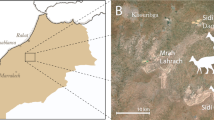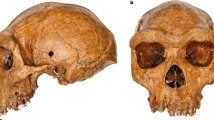Abstract
THIS report describes the stratigraphical and archaeological position of an hominid skull discovered in Pleistocene deposits around Lake Ndutu, on the Serengeti Plains (3°00′S; 35°00′E). The skull itself is described elsewhere1. Lake Ndutu, together with the adjacent Lake Masek, is geomorphologically a continuation of the Olduvai Pleistocene deposits. The names of both lakes have been used to designate the upper parts of the Olduvai Sequence—the Ndutu and Masek Beds (formerly bed V and bed IVB, respectively); both are soda lakes.
This is a preview of subscription content, access via your institution
Access options
Subscribe to this journal
Receive 51 print issues and online access
$199.00 per year
only $3.90 per issue
Buy this article
- Purchase on Springer Link
- Instant access to full article PDF
Prices may be subject to local taxes which are calculated during checkout
Similar content being viewed by others
References
Clark, R. J., Nature, 262, 485–487 (1976).
Author information
Authors and Affiliations
Rights and permissions
About this article
Cite this article
MTURI, A. New hominid from Lake Ndutu, Tanzania. Nature 262, 484–485 (1976). https://doi.org/10.1038/262484a0
Received:
Accepted:
Issue Date:
DOI: https://doi.org/10.1038/262484a0
This article is cited by
-
Lithic Technology at Loiyangalani, a Late Middle Stone Age Site in the Serengeti, Tanzania
African Archaeological Review (2019)
-
Characterizing Archaeological Assemblages from Eastern Lake Natron, Tanzania: Results of Fieldwork Conducted in the Area
African Archaeological Review (2015)
-
Définition du taxon Homo heidelbergensis Schoetensack, 1908 : analyse phénétique du massif facial supérieur des fossiles du genre Homo du Pléistocène moyen
Bulletins et mémoires de la Société d'anthropologie de Paris (2011)
-
Tempo and mode in hominid evolution
Nature (1981)
-
A new hominid fossil skull (L.H. 18) from the Ngaloba Beds, Laetoli, northern Tanzania
Nature (1980)
Comments
By submitting a comment you agree to abide by our Terms and Community Guidelines. If you find something abusive or that does not comply with our terms or guidelines please flag it as inappropriate.



